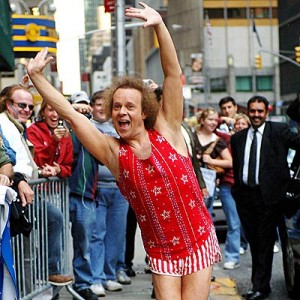Why Your Excuses Are Crap: “I’m too tired”
As part of my ongoing series of Why Your Excuses are Crap, today we examine the “I’m too tired” excuse. A new study demonstrates that lifting weights gives you energy.
Two noteworthy elements:
- Subjects were sedentary — not regular exercisers. These are exactly the kinds of folks who might protest that they’re “too tired” to work out.
- Subjects complained of ongoing fatigue. They already felt like crap.
So here we have a participant group of non-exercisers who feel logey. If anyone’s going to have a reason to keep feeling sucky, it’s these folks.
And all participants were female. (So if you’re reading this and you’re a sedentary non-exercising woman who feels as energetic as a snail in peanut butter, pay attention.)
Participants were given three types of programs.
- Weight training, 4 x 10 reps of 3 lower-body exercises (leg press, leg extension, leg curl) at 70% of 1-rep max
- Weight training, 4 x 10 reps of the same exercises with 15% of 1RM
- No exercise
Researchers measured participants’ vigour and fatigue using short questionnaires taken before, during, and after the experiment.
Fatigue levels didn’t change much, but people reported feeling less fatigued than you might expect given that a workout is supposed to be tiring.
Interestingly, the participants reported feeling more energetic during the workout — almost as soon as the training began. As the researchers report, “among young, sedentary women reporting below-average feelings of energy immediately before the resistance exercise bout, feelings of energy were higher during and following an acute bout of moderate- to high-intensity resistance exercise than in a non-exercise control condition.”
In other words, they didn’t feel energetic before, but they did almost immediately once they got going.
Also interestingly, there wasn’t a whole lot of difference between heavier and lighter exercise. This puzzled the researchers a bit, but they concluded that perhaps even lighter exercise can generate similar effects as heavier.
Matthew P. Herring and Patrick J. O’Connor. The effect of acute resistance exercise on feelings of energy and fatigue. Journal of Sports Sciences, Volume 27, Issue 7 May 2009 , pages 701 – 709.
Abstract
We examined the effect of acute moderate- to high-intensity resistance exercise on feelings of energy and fatigue in sedentary college women reporting a persistent above-average frequency of fatigue. Fourteen sedentary female volunteers reporting persistent fatigue completed three counterbalanced conditions [70% one-repetition maximum (1-RM), 15% 1-RM/placebo, and a no-exercise control]. In the exercise conditions, participants performed four sets of 10 repetitions of three lower-body resistance exercises. The Profile of Mood States-Brief Form (POMS-B) vigour and fatigue mood scores were obtained immediately before conditions, every 11 min and 40 s during conditions, and 20 and 30 min after conditions. The data showed a significant main effect for vigour (P = 0.01). Vigour scores were significantly higher for the 70% 1-RM than the control condition (P = 0.01). No significant difference was observed between the 70% 1-RM and 15% 1-RM/placebo conditions. There was a significant main effect for fatigue (P = 0.04). Fatigue scores were significantly lower for the 15% 1-RM/placebo than the control condition (P = 0.04). Acute moderate- to high-intensity lower-body resistance exercise increased feelings of energy during and after exercise compared with the control. It is unclear whether this effect is a placebo effect because, while it did not differ from the placebo condition, we cannot rule out that resistance exercise at a wide range of intensities produces increased feelings of energy.

